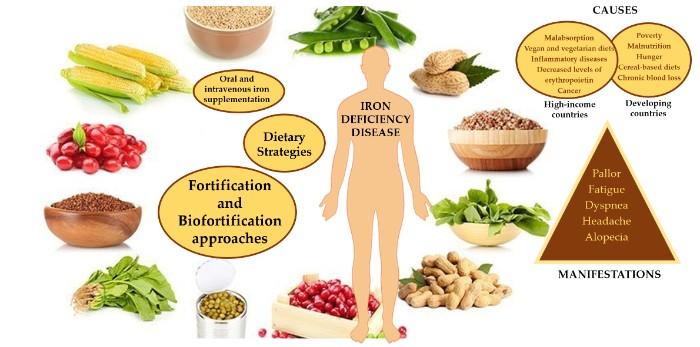It’s no secret that nourishing our bodies healthy shed is essential, but few people know all the different ways to do this. One powerful way to stay healthy is through eating chromium-abundant foods – foods with high levels of chromium.
In this blog post, we'll explore why chromium benefits our health and discuss some good sources you can add to your diet. Keep reading and learn how to get more nutrition from what you eat!
Discover the importance of chromium for bodily health.

Chromium is an essential mineral that plays a crucial role in helping the human body to function properly. Chromium helps regulate blood sugar levels, aids in fat and carbohydrate metabolism, and may even help improve cholesterol levels. Additionally, chromium has been linked to reducing inflammation in the body.
Fortunately, many chromium-abundant foods are available to help you stay healthy and get the chromium your body needs. Here are some of the best chromium-rich foods you should consider adding to your diet:
Broccoli:
Broccoli is an excellent source of chromium, providing nearly 4 micrograms (mcg) per cup. It also contains Vitamin C, dietary fiber, and other antioxidants and minerals.
Whole grains:
Whole grains are a great source of chromium, providing around 22 mcg in one cup. They also provide many essential vitamins and minerals such as magnesium, Vitamin B6, iron, and zinc.
Potatoes:
A medium potato can provide up to 5 mcg of chromium per serving.
Liver:
A 3-ounce portion can provide about 8 mcg of chromium.
Beef:
Three ounces of beef will give you around 6 mcg, plus plenty of protein and iron.
Bananas:
One medium banana contains around 1 mcg of chromium. It also contains potassium and fiber.
Explore how to detect a chromium deficiency and its symptoms.
Chromium is an essential mineral that helps the body regulate insulin and blood sugar levels, as well as aiding in fat and protein metabolism. It's important to ensure you consume enough chromium-rich foods to maintain a healthy lifestyle.
A chromium deficiency can cause fatigue, depression, anxiety, headaches, irritability, skin problems, and insomnia.
To determine if you are deficient in chromium, it is important to consult a doctor regarding lab tests. Blood tests can identify low levels of chromium in the body and confirm a deficiency.
Additionally, an oral supplement may be prescribed by your doctor to help meet daily needs for this essential mineral.
Identify the foods that are most abundant in chromium.
Chromium is a trace mineral that plays an important role in metabolic processes and helps regulate insulin activity. Foods high in chromium can help improve insulin sensitivity, benefiting those with diabetes or pre-diabetes. Additionally, chromium may help reduce unhealthy cholesterol levels and promote healthy weight management.
Some of the most abundant sources of chromium include broccoli, grape juice, potatoes, whole-grain products, bananas, beef, turkey, chicken, apples, and nuts. Other foods high in chromium are mushrooms, garlic, oatmeal, and green beans. You can also find chromium in some fortified foods, such as cereals or baking products.
To ensure you’re getting enough chromium in your diet, it’s important to have a variety of these foods regularly. Additionally, increasing your intake of whole grains and fruits can help boost the amount of chromium you consume.
Lastly, it is recommended that adult males consume at least 35mcg of chromium daily, and adult females should aim for 25mcg.
Learn tips to incorporate more chromium-rich foods into your diet.

If you want to stay healthy, chromium-rich foods are a great way to support your overall health and well-being. Chromium is an essential mineral that helps your body absorb and use glucose, which is important for providing energy. It also plays a role in metabolism and helps regulate blood sugar levels.
Fortunately, many delicious ways to get more chromium into your diet exist. Here are some tips for incorporating more of this important mineral:
- Add nuts and seeds to your meals. Nuts such as almonds, walnuts, and cashews contain higher amounts of chromium, while sunflower and flax seeds also offer a good source.
- Eat plenty of whole grains like oatmeal, barley, and brown rice. These grains contain significant amounts of chromium and other beneficial vitamins and minerals.
- Include a variety of fruits and vegetables in your diet. Broccoli, potatoes, bananas, apples, grapes, oranges are good chromium sources.
- Try to incorporate lean proteins like fish or poultry into each meal. Not only are these proteins rich in chromium, but they're also good for muscle growth and development.
Adding more chromium-rich foods to your diet can help support your body's health and energy levels. You'll be well on your way to a healthier lifestyle with a few minor meal adjustments.
Understand how chromium interacts with other nutrients and minerals
Chromium is an essential mineral that plays a role in metabolizing carbohydrates, proteins, and fats. It helps maintain healthy blood sugar levels and may benefit individuals with diabetes.
Chromium also aids in converting nutrients into energy and helps reduce body fat.
It has been suggested that chromium interacts synergistically with other minerals, vitamins, and phytonutrients to enhance its absorption and utilization in the body.
For example, chromium is believed to interact with vitamin C, niacin, phosphorus, magnesium, iron, zinc, and other minerals to boost the effectiveness of their actions.
Therefore, getting enough chromium from foods that provide a good balance of nutrients is important. Here are some chromium-rich foods that can help keep you healthy:
Whole grains: Whole grains like wheat, oats, and barley are great sources of chromium.
Legumes: Legumes such as lentils, black beans, chickpeas, and peanuts contain a high amount of chromium.
Fruits: Apples, bananas, and oranges are all good sources of chromium.
Vegetables: Broccoli, kale, and spinach are particularly rich in chromium.
Nuts and seeds: Almonds, walnuts, and flaxseeds are all good sources of chromium.
FAQs
1. What are chromium-abundant foods?
Chromium-abundant foods contain a significant amount of dietary chromium, an essential trace mineral that the body needs to stay healthy and regulate blood sugar levels. Some examples of such foods include broccoli, grape juice, turkey breast, potatoes, wheat germ, applesauce, and green beans.
2. What are the health benefits of eating chromium-abundant foods?
Eating foods with abundant dietary chromium can help your body regulate blood sugar levels, reduce cholesterol and triglyceride levels, improve insulin sensitivity, and even aid in weight loss. Additionally, chromium helps to protect against heart disease by decreasing inflammation and improving overall cardiovascular health.
3. What are the potential risks of consuming too much chromium?
Excessive consumption of dietary chromium can lead to an increased risk of kidney stones and a risk of developing certain types of cancer. Therefore, it is important to consult with your doctor or nutritionist before increasing your intake of chromium-rich foods.
Conclusion
This article has been informative and has given you a better understanding of chromium-abundant foods and how adding them to your diet can help keep you healthy. Include these foods regularly for essential nutrients that support metabolism, energy levels, and overall well-being.
Chromium-rich diets are also beneficial for those looking to lose weight, as the mineral can help reduce cravings, improve metabolism, and regulate blood sugar levels.




